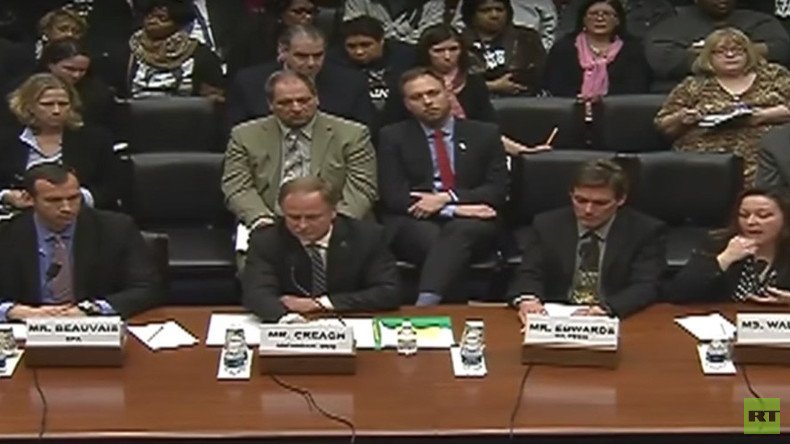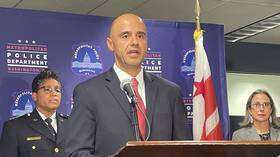'Not some Third World country': Anger and blame at Flint water hearing in Congress

Anger ran hot and fingers of blame were pointed every which way at the first congressional hearing about the water disaster in Flint, Michigan. Health officials faced withering criticism, while the committee vowed to “hunt down” missing witnesses.
“This is a failing at every level. The public has a right to be outraged and it must be fixed,” thundered the chairman of the House Oversight & Government Reform Committee, Jason Chaffetz (R-Utah) in his opening remarks.
“This is the United States of America – this isn't supposed to happen here,” Chaffetz said. “We are not some Third World country.”
Person in galley at hearing holds up Contaminated Flint water and human hair. @NBC_25@maddowpic.twitter.com/mSzCJiJ7MU
— Dave Bondy (@DaveBondyTV) February 3, 2016
Flint’s water supply became contaminated by dangerously high levels of lead following the decision to use Flint River as the source, instead of paying nearby Detroit for properly purified water. The switch took place in early 2014. Sorting out who was responsible for the decision, however, proved as contentious as establishing who among the relevant state and federal officials knew about the lead problem, and when.
READ MORE: Flint water crisis triggers debate over lead poisoning of children across US
The Michigan Department of Environmental Quality (MDEQ) “incorrectly advised the city of Flint that corrosion control treatment was not necessary, resulting in leaching of lead into the city’s drinking water,” argued Joel Beauvais from the Environmental Protection Agency’s (EPA) Office of Water.“EPA regional staff urged MDEQ to address the lack of corrosion control, but was met with resistance.”
While not disagreeing, MDEQ director Keith Creagh pointed out that the EPA had not forwarded the June 2015 memo about the water crisis to the local authorities until November.
“When government finally responded to the public outcry, thanks to the relentless efforts of independent scientists whose warnings turned out to be correct – our tone was combative and dismissive,” said Creagh, who was appointed in January.
Va. Tech's Marc Edwards absolutely destroying the EPA in this Flint Water Crisis hearing https://t.co/efk5hyOktbpic.twitter.com/higvskjkEx
— Craig Newman (@craignewman) February 3, 2016
Marc Edwards, the Virginia Tech professor whose team helped expose the crisis, also pointed the finger at the EPA. He described the situation as “part ‘1984’ and part ‘Enemy of the State’.”
“Had it not been for people completely outside the system, children in Flint would still be drinking that water today. That is a fact,” Edwards told the lawmakers. “I’m begging you, please: fix the EPA lead and copper rule, and fix the EPA.”
After Beauvais admitted that EPA Administrator Gina McCarthy first visited Flint only yesterday, Arizona Republican Paul Gosar called it “despicable.”
READ MORE: Michigan officials played blame game over Flint water crisis, emails show
Elijah Cummings, a Maryland Democrat and ranking member of the committee, took issue with the fact that Flint residents were still getting billed for the toxic water.
“Are the people paying right now in Flint, for the water they cannot wash in, and cannot use, and cannot drink?” Cummings asked Creagh. “Why would they be paying for water that they cannot even use, and is poisoning them? That’s not American!”
Cummings also argued the fault for the crisis was with Governor Snyder and the emergency managers he appointed. Criticizing Snyder’s remarks about the Flint city council voting in 2013 to change the city’s source of water, Cummings pointed out the council had no power, and that all decisions were made by Snyder-appointed emergency managers – Ed Kurtz in 2013, and Darnell Earley in 2014.
Though he was summoned, Earley declined to appear at the hearing, saying that the subpoena came too late to arrange a trip to Washington, DC and citing his duties as the emergency manager for the Detroit public school district. Under fire by parents and teacher unions over “deplorable” conditions in the city’s schools, Earley said he would step down at the end of February.
Darnell Earley, @DPSk12 EM, Ex #Flint EM, is getting lambasted at #flintwatercrisis hearing https://t.co/Yt8AgjeC68pic.twitter.com/Je1l6ZEMcI
— The Detroit News (@detroitnews) February 3, 2016
Chaffetz said the committee would issue a new subpoena for Earley and call on the US Marshals to “hunt him down.”
“Participation before this committee is not optional,” he said. “When you get invited to go before the Oversight and Government Reform Committee, you are going to show up.”
“We want answers from everybody, from the EPA straight on down to the local officials,” said Cummings.
Jason Chaffetz wants US Marshals to "hunt down" witness who refused to testify on #FlintWaterCrisishttps://t.co/A9dowlzhJA
— Devin Henry (@dhenry) February 3, 2016













